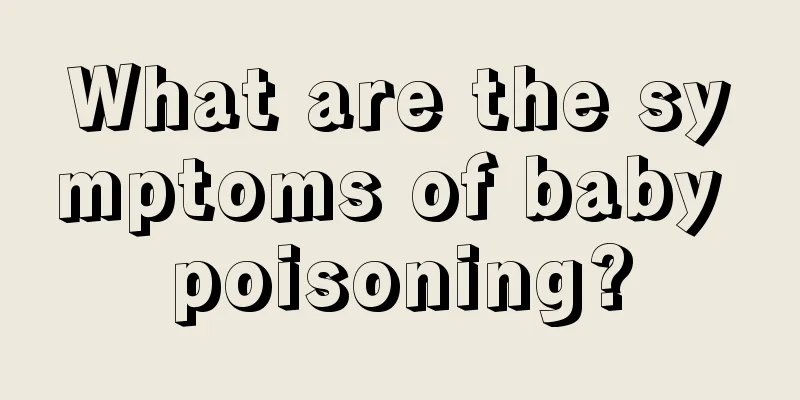What are the symptoms of baby poisoning?

|
I believe many people know that due to physical development in the early stages of a baby's life, the immune system and various body functions are in a developmental stage. At this stage, some problems are prone to occur, many of which are caused by an imperfect immune system. Sometimes, due to carelessness in daily diet, babies will show symptoms of poisoning. But these symptoms are sometimes not too obvious, so what symptoms can parents use to judge whether the baby has symptoms of poisoning? 1. Digestive system In acute poisoning, gastrointestinal symptoms are usually most prominent. Most of the poisons are ingestion poisoning, and a few are non-ingestion poisoning. After the poison enters the digestive tract, the direct stimulation of the intestines and the destruction of local tissues of the digestive tract can cause symptoms such as abdominal pain, nausea, vomiting and diarrhea. After being absorbed, the poison can also cause the same symptoms through nerve reflexes and systemic effects. Therefore, if children suddenly develop acute gastrointestinal symptoms of unknown cause, care should be taken to identify whether they are poisoned. 2. Circulatory system Most poisoning patients will experience circulatory system symptoms, such as tachycardia, poor peripheral circulation perfusion, etc. Some of these patients developed fatal heart failure and shock during acute poisoning. There are two reasons: one is that the poison acts directly on the myocardium, causing myocardial dysfunction and heart failure. The other is that poisons inhibit oxygen uptake and metabolism by acting on the blood vessels and nervous system, leading to severe arrhythmias, hypotension, or electrolyte metabolism disorders, and ultimately causing secondary heart failure. The autonomic nervous system has a greater impact on the cardiovascular system. Toxins with sympathetic nervous system stimulant effects can increase blood pressure, cause rapid and irregular heart rate, while parasympathomimetic poisons can cause bradycardia. 3. Respiratory system Many poisons, including inhaled toxic gases, can impair respiratory function. Poisoned patients may experience irritating coughing, dyspnea, cyanosis, pulmonary edema and irregular respiratory rhythm. In severe cases, it may lead to depression of the respiratory center or paralysis of the respiratory muscles and respiratory failure. A garlic smell can be smelled in the exhaled breath of people with organophosphorus poisoning. |
<<: Symptoms of hip dislocation in children
>>: Epilepsy symptoms and treatment in children
Recommend
What is the matter with the child's blue poop?
After having a baby in the family, many things be...
What should students eat when they stay up late?
Students nowadays are working particularly hard, ...
Why does my baby have bad breath in the morning?
Some mothers may find that their babies have bad ...
Why do children suddenly keep blinking?
It is a common phenomenon in life that children b...
What should children eat to grow taller?
There are many factors that affect children's...
What to do if a three-year-old child has diarrhea
Parents should pay attention to children's di...
If your child has a stomachache, beware of these 7 dangerous diseases that parents should not ignore.
Many children have experienced stomachaches, and ...
What to do if one month old baby has green stool
What to do if a one-month-old baby has green stoo...
How to treat small blisters on baby's hands
If your baby has small blisters on his hands and ...
What are the prevention and control measures for hand, foot and mouth disease?
Hand, foot and mouth disease is a human comorbidi...
How to guide children to have a good nap
Children are still young, and their bodies need t...
What should I do if my son has a fever and convulsions?
Many families will ask doctors what to do if thei...
Is a child's temperature of 38.3 degrees considered a fever?
Once they find that their children have a fever, ...
What are the methods to relieve cough in children?
I believe that for every parent, the illness of t...
What causes green stools in three-month-old babies?
Green stools are a common symptom of disease in t...









